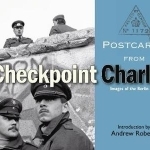
Tank Battle: East Front 1944
Games and Entertainment
App
Tank Battle: East Front 1944 is the penultimate title in the successful ‘Tank Battle: East...
Toupie Lowther: Her Life - a New Assessment
Book
Toupie Lowther appears as a walk-on character in many biographies of Radclyffe Hall and Una...

Postcards from Checkpoint Charlie: Images of the Berlin Wall
Book
Between 1945 and 1961, an estimated 2.5 million people fled East Germany in search of the political...

Svetik: A Family Portrait of Sviatoslav Richter
Anthony Phillips, Vladimir Ashkenazy and Walter Moskalew
Book
For well over half a century, since the Soviet regime first allowed Sviatoslav Richter to travel to...

The Collapse: The Accidental Opening of the Berlin Wall
Book
On the night of November 9, 1989, massive crowds surged toward the Berlin Wall, drawn by an...

Berlin: Portrait of a City
Book
The brave city: A photographic portrait of Berlin, 1860 to today Berlin has survived two world wars,...
ClareR (6067 KP) rated The German House in Books
Dec 30, 2019
I really enjoyed this novel. It was hard-going at times, and it did read like a translated novel. It did however, catch the spirit of the time. Eva’s longing to break out of the societal restrictions of the time (for example when she refers to how much she likes a new Beatles song that Jürgen can’t understand, he doesn’t like pop music) and Jürgen’s wish that she stops work as soon as she gets engaged (as a modern woman, I was positively fuming at this point!!).
I was fascinated by the trip the Court makes to Auschwitz - somewhere I’ve never been, and after a trip to Oranienburg (a camp for political prisoners outside Berlin), I feel that I would struggle to go. This was one of the most emotional parts of the book.
The side story involving Eva’s older sister is also fascinating, and I feel portrays the effect of seeing so much violence and hatred as a young child (no spoilers here!).
All in all, after I got used to the writing style, I really enjoyed this. It was an interesting insight into the post-war years, and West Germany’s reaction to the damage and destruction that the Nazis had caused during the Holocaust.
This is well worth a read.
Many thanks to NetGalley and the publisher for my copy of this book to read and honestly review.

First Out in Earnest: The Remarkable Life of Jo Lancaster DFC from Bomber Command Pilot to Test Pilot and the Martin Baker Ejection Seat
Book
John Oliver (Jo) Lancaster DFC had a remarkable career in aviation spanning half a century. Starting...

Spearhead: An American Tank Gunner, His Enemy, and a Collision of Lives In World War II
Book
From the New York Times bestselling author of A Higher Call comes the riveting story of an American...
Schulz und Schulz: St Trinitatis Leipzig
Wolfgang Jean and Stefan Muller
Book
Text in English & German. Three places mark the chequered history of the provost church of St...

